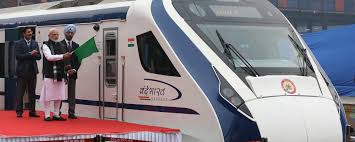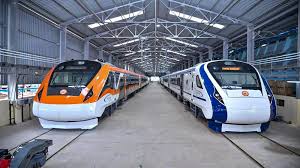
Kazan, Russia. India offer of Vande Bharat trains to Russia has taken a new turn, as discussions around regulatory and technical hurdles are expected to feature prominently during Prime Minister Narendra Modi’s visit to Kazan this week. Modi’s visit, coinciding with the BRICS Summit, is set to include talks with Russian President Vladimir Putin on October 22. Among the key issues is the $6.5-billion joint venture between Russia’s Transmashholding (TMH) and India’s Rail Vikas Nigam Ltd (RVNL), which aims to manufacture and maintain Vande Bharat train sets. These high-speed trains have become a flagship project in India’s railway modernization efforts, and their potential export to Russia could symbolize deepening economic ties between the two nations. The TMH-RVNL consortium secured a tender in March 2023 to manufacture 200 Vande Bharat train sets, a deal initially valued at ₹58,000 crore. However, the government later revised the contract, reducing the project size to 120 train sets, and scaling back the total value to ₹36,000 crore. The initial momentum of the joint venture faced setbacks, including regulatory challenges and requests for changes in the shareholding structure of the special purpose vehicle (SPV) Kinet Railway Solutions Ltd. The SPV was formed by RVNL and Russian entities Metrowagonmash (MWM) and Locomotive Electronic Systems (LES). Despite the proposed changes being limited to Russian partners and not affecting RVNL 25% stake, the approval from Indian authorities remains pending, stalling the project progress. In addition to the regulatory delays, the venture has faced difficulties stemming from the broader geopolitical environment. Sanctions against Russian entities like TMH in the wake of Russia’s invasion of Ukraine in 2022 have added complexity to the deal. To navigate these sanctions, TMH sought to adjust its shareholding between MWM and LES—roposing to reduce MWM’s stake from 70% to 5%, while LES’s stake would increase to 70%. This restructuring was seen as a move to ensure the venture’s continued operation despite international restrictions. Yet, the request has lingered without approval for months, highlighting the need for high-level diplomatic intervention. To address these challenges, a delegation led by senior TMH officials visited India in September, engaging with officials in New Delhi and inspecting the project’s proposed site in Maharashtra. This visit underscored the urgency of resolving the impasse and ensuring that the project stays on track. The project is to be located in Maharashtra, where the manufacturing of the Vande Bharat train sets is expected to generate local employment and enhance the state industrial profile. Despite these complications, the urgency to move forward has grown, as India and Russia look to maintain strong ties amidst shifting global alliances. Modi and Putin’s upcoming meeting offers a crucial opportunity to address these regulatory roadblocks, especially as the project’s timeline looms closer. TMH and RVNL must deliver the first prototype train set by June 2025, with plans for gradual manufacturing to follow. Any delays could disrupt India ambitious schedule, which includes delivering 12 train sets annually in the initial years and scaling up thereafter to meet the overall target of 120 train sets. In addition to the shareholding change, the project has encountered further adjustments. The Indian government has proposed increasing the number of cars per train from 16 to 24, while reducing the total number of train sets. This move, aimed at enhancing the capacity of each train, has introduced additional technical requirements, potentially extending timelines. Such modifications are anticipated to delay the project’s rollout, making the discussions during Modi's visit to Kazan critical for ironing out these details and ensuring a smooth path forward.

For India, the JV’s progress remains a priority, given the Vande Bharat trains' significance in its domestic railway modernization efforts. The Vande Bharat Express, known for its modern features and faster travel time, represents India’s push towards high-speed rail travel. At the same time, the venture serves as a symbol of India-Russia collaboration amidst a challenging international environment. The project offers Russia an opportunity to partner with India on a large-scale infrastructure initiative, particularly at a time when Moscow is facing economic isolation from Western markets. As Modi and Putin prepare to meet on the sidelines of the BRICS Summit, the potential to resolve these challenges could play a key role in shaping the next phase of India-Russia relations. Both leaders are expected to take stock of the current status and discuss the necessary steps to keep the project on track, showcasing their intent to maintain strong bilateral ties despite geopolitical tensions. The success of the Vande Bharat joint venture could serve as a testament to the resilience of the India-Russia partnership, even as they navigate new challenges on the global stage.
Author Profile
- India Writes Network (www.indiawrites.org) is an emerging think tank and a media-publishing company focused on international affairs & the India Story. Centre for Global India Insights is the research arm of India Writes Network. To subscribe to India and the World, write to editor@indiawrites.org. A venture of TGII Media Private Limited, a leading media, publishing and consultancy company, IWN has carved a niche for balanced and exhaustive reporting and analysis of international affairs. Eminent personalities, politicians, diplomats, authors, strategy gurus and news-makers have contributed to India Writes Network, as also “India and the World,” a magazine focused on global affairs.
Latest entries
 DiplomacyJanuary 5, 2026India walks diplomatic tightrope over US operation in Venezuela
DiplomacyJanuary 5, 2026India walks diplomatic tightrope over US operation in Venezuela India and the WorldNovember 26, 2025G20@20: Africa’s Moment – The Once and Future World Order
India and the WorldNovember 26, 2025G20@20: Africa’s Moment – The Once and Future World Order DiplomacyOctober 4, 2025UNGA Resolution 2758 Must Not Be Distorted, One-China Principle Brooks No Challenge
DiplomacyOctober 4, 2025UNGA Resolution 2758 Must Not Be Distorted, One-China Principle Brooks No Challenge India and the WorldJuly 26, 2025MPs, diplomats laud Operation Sindoor, call for national unity to combat Pakistan-sponsored terror
India and the WorldJuly 26, 2025MPs, diplomats laud Operation Sindoor, call for national unity to combat Pakistan-sponsored terror







